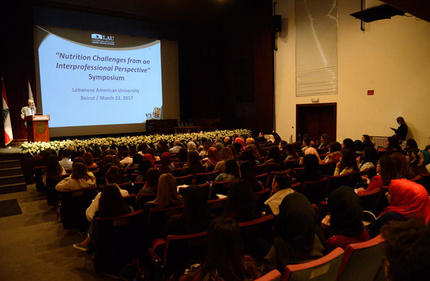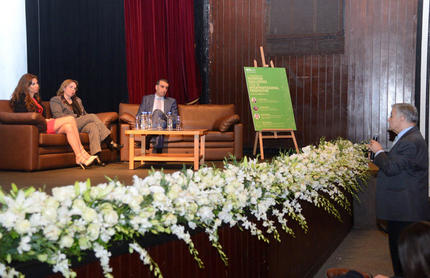LAU advocates interprofessional collaboration in patient care
The Nutrition Program invites speakers from different backgrounds to share their experiences in interprofessional health work.
Dozens of students and professionals in nutrition gathered at LAU Beirut on March 22 to debate the challenges faced by the field from an interprofessional perspective.
“Nutrition problems cannot be solved without the input of other disciplines like pharmacy, medicine, nursing and food science,” said Hussein Hassan, assistant professor of Food Science and Technology at the Department of Natural Sciences and organizer of the event.
A strong advocate of interprofessional education, LAU is the only university in Lebanon to have developed an effective interprofessional approach involving its three health schools―medicine, nursing and pharmacy―along with its nutrition and social work programs.
Invited to speak at the event beside two other professionals with different profiles, Dean of LAU’s School of Pharmacy Imad Btaiche shared the lessons learnt from 18 years spent working with an interprofessional team in the U.S.
Before joining the university in 2011, Btaiche was clinical associate professor at the College of Pharmacy as well as clinical pharmacist and program director of the Critical Care Specialty Residency at the University of Michigan Hospitals and Health Centers. There, he also acted as the Nutrition Support team leader and was a clinician team member of the Children’s Intestinal Rehabilitation Program at the Department of Pediatrics and Pediatric Surgery.
From a professional point of view, “Working as a team leads to better results, it’s proven,” he declared. “You have one goal, several objectives and different means, which allows you to have an effective impact not only on your patients’ health but also on policy making,” he added. The experience is equally enriching from a personal perspective, the pharmacist explained: “It is a way to work on yourself and learn from people different than you.”
Global Food Safety Lead at Mars Chocolate Zeina Kassaify agreed, considering herself “the result of uncommon collaborations.”
With an academic background in nutrition and food science, Kassaify was chairperson and professor of food microbiology at the American University of Beirut for several years before joining the private sector in 2014.
Focusing on food safety challenges, she said: “It is not enough to make regulations. You have to work with the companies themselves in order for everyone to benefit from healthier food through a sustainable process… Food safety affects us all, so it is important to have everyone on board.”
Collaboration was also the keyword in the presentation of Roula Barake, director of the Nutrition Department at the Dasman Diabetes Institute in Kuwait. With the aim of raising awareness against the chronic disease, she has worked with different institutions, from ministries to schools, in order to reach out to people and gain their trust. Sharing the successful results of her team’s work, she told the audience: “This experience shows how effective you can be when you put your hands together in order to overcome problems.”
For Associate Professor and Coordinator of the Nutrition Program at LAU Nadine Zeeni there are more chronic and complex diseases than before. “We don’t have a good history of working together. The lack of coordination and communication are main issues in the field of health! An interprofessional approach can give students new skills and better prepare them for their future professional responsibilities,” she said, adding that “patients and clients deserve better.”
The ideas and recommendations of the experts resonated with the attending students, such as Alexandra Daccache, a senior in nutrition at LAU: “I think that nutrition has always been underestimated by other disciplines, so it is interesting to consider patient care as a whole and integrate nutrition better,” she enthused. “Now, I want to see how I can help doing that too. I could be a part of it.”
More
Latest Stories
- SOE Launches its Distinguished Scholar Visiting Program with International Guest Dr. Feras Batarseh
- LAU Nursing Camp Opens Eyes, Hearts and Futures
- Meet Dr. Zeina Khouri-Stevens, Executive Vice President for Health Services
- LAU Family Medicine Graduates to Benefit from a Partnership With Nova Scotia
- AKSOB Assistant Professor Shares Her Vision for the Future of Learning
- LAU Simulation Models Celebrate 20 Years of Learning, Leadership and Service
- The School of Engineering Hosts the Lebanese Electromagnetics Day
- LAU Stands Out on the Sustainability Scores



